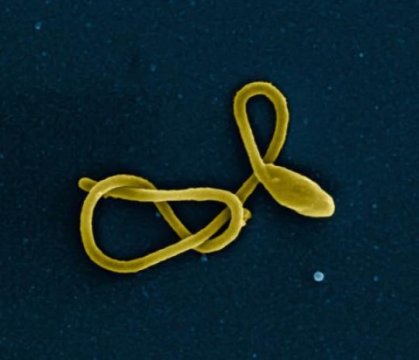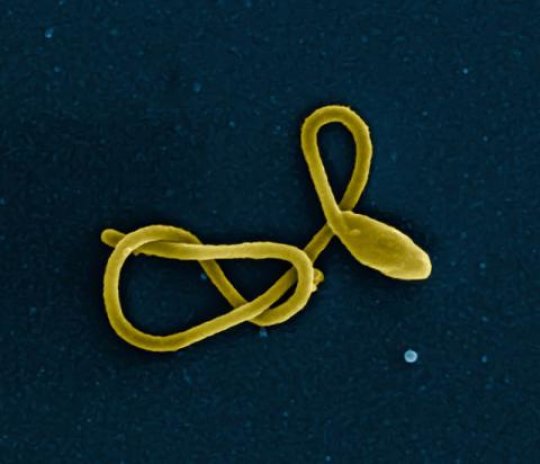[ad_1]

Colorized scanning electron micrograph of a single filamentous Ebola virus particle.
Credit: NIAID
Recent Ebola virus disease (EVD) outbreaks, including the 2013-2016 epidemic that ravaged West Africa and the 2018 outbreak in the Democratic Republic of the Congo, highlight the need for licensed treatments for this often-deadly disease. ZMapp, an experimental therapy comprising three monoclonal antibodies, has shown promise in a clinical trial, but it targets only one of the five known species of Ebola virus. Now, scientists supported by the National Institute of Allergy and Infectious Diseases (NIAID), part of the National Institutes of Health, have discovered a set of powerful, broadly neutralizing antibodies (bNAbs) in the blood of EVD survivors. In animal studies, two of these antibodies provided substantial protection against disease caused by Zaire ebolavirus, Bundibugyo ebolavirus and Sudan ebolavirus, the three species known to cause fatal human illness.
James E. Crowe, Jr., M.D., of Vanderbilt University Medical Center, Nashville, and Alexander Bukreyev, Ph.D., of University of Texas Medical Branch, Galveston, headed the research team. The investigators analyzed blood plasma from 17 people who had recovered from EVD. Antibodies isolated from two survivors bound to an essential virus protein, called glycoprotein or GP, from Zaire, Bundibugyo and Sudan Ebola virus species, and prevented the viruses from entering host cells.
Ebola virus uses GP to attach to cell membranes and initiate infection. In a series of experiments, the team delineated interactions between various forms of viral GP and three of the newly isolated bNAbs. The results provided evidence of multiple mechanisms by which the antibodies inhibit actions of all forms of GP, thus preventing infection by halting viral entry into the host cell. The team also determined that one of the bNAbs, EBOV-520, recognizes and binds to a portion of virus GP in such a way that prevents it from interacting with a cell surface protein called NPC1 and initiating the infection cycle.
The researchers conclude that these broadly neutralizing antibodies are promising candidates for further development as therapeutic molecules against several ebolavirus species.
Story Source:
Materials provided by NIH/National Institute of Allergy and Infectious Diseases. Note: Content may be edited for style and length.
Journal Reference:
- Pavlo Gilchuk, Natalia Kuzmina, Philipp A. Ilinykh, Kai Huang, Bronwyn M. Gunn, Aubrey Bryan, Edgar Davidson, Benjamin J. Doranz, Hannah L. Turner, Marnie L. Fusco, Matthew S. Bramble, Nicole A. Hoff, Elad Binshtein, Nurgun Kose, Andrew I. Flyak, Robin Flinko, Chiara Orlandi, Robert Carnahan, Erica H. Parrish, Alexander M. Sevy, Robin G. Bombardi, Prashant K. Singh, Patrick Mukadi, Jean Jacques Muyembe-Tamfum, Melanie D. Ohi, Erica Ollmann Saphire, George K. Lewis, Galit Alter, Andrew B. Ward, Anne W. Rimoin, Alexander Bukreyev, James E. Crowe. Multifunctional Pan-ebolavirus Antibody Recognizes a Site of Broad Vulnerability on the Ebolavirus Glycoprotein. Immunity, 2018; DOI: 10.1016/j.immuni.2018.06.018
Cite This Page:
NIH/National Institute of Allergy and Infectious Diseases. “Broadly acting antibodies found in plasma of Ebola survivors: Discovery could lead to therapy for deadly illness.” . , 17 July 2018. <www..com/releases/2018/07/180717142540.htm>.
NIH/National Institute of Allergy and Infectious Diseases. (2018, July 17). Broadly acting antibodies found in plasma of Ebola survivors: Discovery could lead to therapy for deadly illness. . Retrieved July 17, 2018 from www..com/releases/2018/07/180717142540.htm
NIH/National Institute of Allergy and Infectious Diseases. “Broadly acting antibodies found in plasma of Ebola survivors: Discovery could lead to therapy for deadly illness.” . www..com/releases/2018/07/180717142540.htm (accessed July 17, 2018).
[ad_2]















